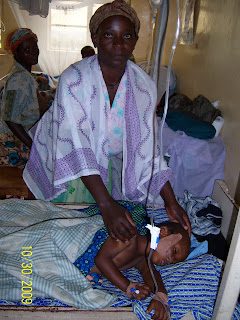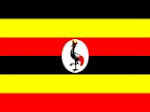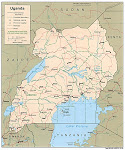 This is my little buddy Joaquim. He's being treated for Malaria and is doing quite well.
This is my little buddy Joaquim. He's being treated for Malaria and is doing quite well.This little boy was very ill from Malaria, but recovered. He was one I thought may 


The little one in the middle is a patient in the "less acute" part of the Children's Ward.
This woman nurses both of her twins. One of the babies is a patient, but the other became ill as well.

I thought this little girl was adorable!
.JPG)
This woman carries her baby in the traditional African way.

This is the 30-bed "sub-acute" area of the Children's Ward. It is very crowded and these children are rarely seen by medical personnel.
This would be considered the Pediatric Intensive .JPG)
This is the Nurse's Station for the entire Children's Ward, which currently houses about 54 patients. That is a nurse on the right and the guy on the left is Edmond. He's a clerk, but he is awesome with getting IV's on those who are difficult to obtain. I call him the "I.V. King" and he laughs.
This has been quite a week of overwhelming circumstances for a girl from a small town in Idaho!
I was picked up Sunday afternoon by Sister Theresa Kamugole and her driver for the long 7-hour drive to the village of Kilembe. En route, Sister received a call that the Head Priest at the Kilembe Diocese and Hospital had been killed in a horrible car accident. Since she is the Administrator of the Kilembe Mines Hospital and a nun, we had to go to Mubende, Uganda so she could prepare his body for viewing and burial. He had done much work with the Ugandan government and directly reported to the President of The Republic of Uganda, so was given a State viewing and burial. She was very distraught about this, as she has worked closely with him for more than 16 years and he was her "family". Sister ended up staying on in Mubende and I rode the rest of the way alone with the driver Patel.
I have been surprised to find that although most Ugandans who attended school learned English, it is still difficult for me to understand them. They speak slowly, use long vowel sounds and ennunciate everything so much, that I cannot understand them and they do not understand me. I repeat myself many, many times. For example, when they say the word "Africa", they say "Aff-ree-kah". Each village or tribe has its own language, so many Ugandans have language barriers even with each other. I liken it to Northerners trying to understand Southerners in the U.S. Although Swahili is more common in the larger cities, "Lugandan" is spoken here and is very difficult for me to grasp. There is a lot of tongue rolling and even though I can try to repeat something they are trying to teach me, I can't remember it for long. I am called a "Mzungu", which means "white person" and I hear many children say that as they are pointing to me in wonder.
Names are interesting because most people have two names...generally a very African first name, followed by one that to me, is surprising...like "Jennifer" or "Patrick". I'm called Christine usually, because to Ugandans, that is more normal than Christy.
The currency is the Ugandan shilling and US$1 equals about 1900 Ugandan Shillings. One is considered to be rich if one makes more than 750,000 Ugandan shillings/month, which is only about $350 USD.
They are such polite and formal people and although they stare at me in wonder since I am the ONLY white person some have ever seen, if I say "Good morning", I am always greeted with a "Good Morning Madame". Women ONLY wear long dresses or skirts and most men wear long-sleeved collared dress shirts and suits or dress slacks.
People get around on foot or by "boda boda" which is a scary motorcycle. Pigs, cows and goats wander all over the place.
I have been welcomed here hundreds of times and am repeatedly thanked for helping them, which brings me to my work. I started in the Children's Ward or "Toto Ward", as they call it and what an eye-opening experience this is!
This village lies at the base of the Rwenzori Mountains in southwestern Uganda. They have a tiny post office, one gas station and a few little shops. The hospital is both public/private, which means patients pay a small fee for services, which can cause a terrible burden on them. The hospital was built for 100 patients, but currently has a census of about 220. Meals are not provided and there is not adequate staff to care for the patients, so families are expected to accompany the patients and provide food and care for them. The families all sit outside in the compound on the ground and have to find a way, three times a day to bring a hot meal to whomever is inside. The hospital has a rudimentary space in the back where families may cook over a fire, but they must provide their own firewood.
There is no running water, only water that is brought in from the river, so it is of course, contaminated and must be boiled for drinking. Because of the difficulty of this, I believe that most here are basically dehydrated. Mothers or grandmothers nurse their infants, as there is no formula or bottles. No one has even heard of diapers and babies/toddlers who are not potty-trained pee/poop at will whenever the urge strikes them, so you can imagine the problems this can cause. Families must provide their own sheets and usually only have one or two, so if one is soiled, the other must be washed by hand, in a bowl, outside and then set out on the ground to dry. This happens many, many times each day and the children are usually soaked and so, I have not picked a baby up yet. Everything smells of urine, but there is no solution at hand. I brought in baby wipes today and you would have thought I had invented fire! I went from baby to baby cleaning them up and showing the mothers how and they were amazed.
The parents/grandparents seem to be very devoted to each other and most of the children have both parents at their bedside around the clock. The ones who aren't there are temporarily out caring for their other children or obtaining food/water.
So far, Malaria is the worst problem I have seen. The Anopheles mosquito is the only mosquito that can transmit Malaria to humans and because it is quite hot here year round, everyone's windows are open and the little buggers come through wherever they can. Everyone sleeps under a mosquito net. I'm getting quite an education about children with Malaria and this is basically what happens: The child develops a fever and within 24 hours, can easily be 104 degrees, followed by lethargy, listnessness, loss of appetite, dehydration, coma and death when untreated. The child goes from well to deathly ill so quickly, it is hard for a parent to seek treatment fast enough, before the disease is "severe". The parasites secrete toxins in the blood of the patient and that's what makes them so incredibly sick. Malaria can only be detected through a blood test.
The treatment for Malaria in children here is blood test confirmation, IV fluids of 5% glucose (that was odd to me, but upon researching this I found that the patient's blood sugar levels drop so low and will cause brain damage), oral or rectal Parecetemol (Tylenol), antibiotics and oral/IV Quinine. It's a brutal illness and I have 2 patients in my ward that look like they may not survive it. I haven't seen either of them conscious in 2 days.
There is so much more and I have many interesting pictures that I will try to post soon. I walk around asking people permission to take their pictures and when they say yes, I take the picture and then show them their image on my camera, which completely delights them. They love me for it now!
Thank you for all your support.
Much love,
Christy








